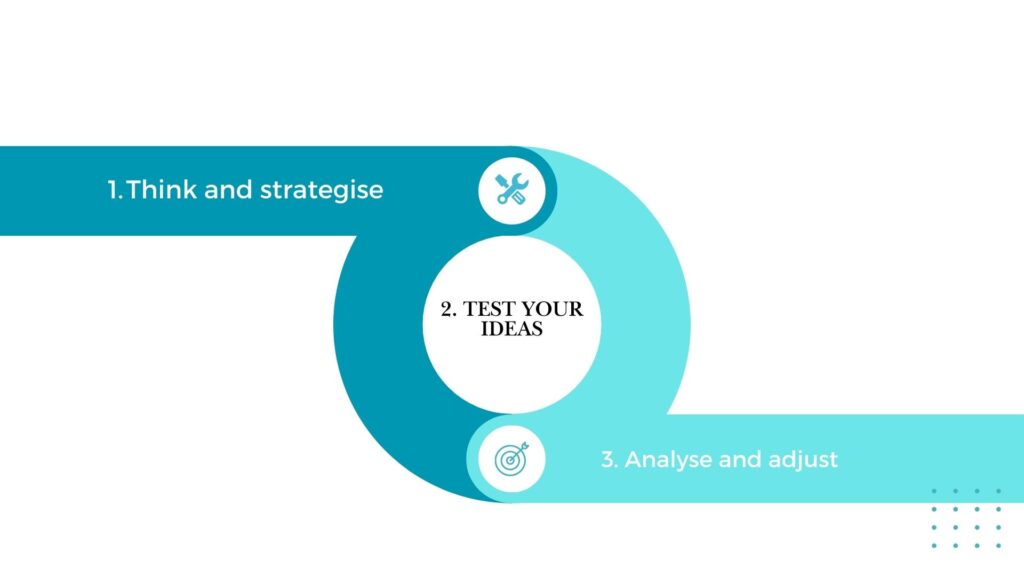Starting your own small business is an exciting journey, but it all begins with careful planning. A business plan is your roadmap—it helps you stay focused, secure funding, and understand how your business will operate. The plan should cover five key areas: your strategic focus, marketing plan, operations plan, staffing plan, and financial plan. Let’s break these down and explore how they apply to small businesses in South Africa, with practical examples and advice.
A Step-By-Step Approach: The planning cycle
Planning your business isn’t a one-and-done task—it’s an ongoing process that evolves as you learn, grow, and adapt. Whether you’re just starting your business plan or refining it over time, using a three-step cyclical planning process can help you stay focused and make informed decisions. Let’s break it down in a way that’s easy to follow and tailored for small businesses.
Step 1: Think and Strategise
Start by getting clear on your goals. What do you want to achieve, not just for your business overall but in each specific area like marketing, operations, or finances? Be as specific as possible. For example, if you’re opening a coffee shop in Durban, don’t just say, “I want to attract customers.” Instead, set a target like, “I want to serve 100 cups of coffee a day within the first three months.”
Use tools like workflow diagrams, financial projections, or even simple to-do lists to map out your plans. Adding figures, timelines, and targets in rand values makes your objectives concrete and actionable. The more detailed your planning, the easier it will be to measure progress and spot gaps in your strategy.
Step 2: Test Your Ideas Through Research
This is where you roll up your sleeves and dig into the details. Research is your best friend when it comes to validating your ideas. Use a variety of methods—speak to people in the industry, read up on trends, and observe your local market. If you’re planning to sell handmade crafts at a market, spend a weekend visiting similar markets in your area. Watch what customers are drawn to, ask stallholders about their experience, and take note of pricing and popular products.
It’s important to stay realistic during this stage. Don’t just look for information that supports your idea; find out where the challenges lie. Maybe you discover that customers prefer lower-priced items, or that setup fees for a market stall are higher than expected. By narrowing your initial idea down to something practical and feasible, you’ll have a stronger foundation to build on.
When speaking to people, stay professional and avoid leading questions. For instance, instead of asking, “Don’t you think my idea for a juice bar is great?” ask, “What do you think would make a juice bar stand out in this area?” You’ll get more honest feedback and may even start building relationships with potential suppliers or customers. Always be respectful—if you’re approaching shop owners or institutions for information, get their permission first and avoid pushing for sensitive details.
Step 3: Analyse and Draw Conclusions
Once you’ve gathered your research, it’s time to step back and evaluate it. Always err on the side of caution when drawing conclusions. For example, if a similar business reports earning R100,000 a month, assume that’s the best-case scenario, not something you’re guaranteed to achieve. This approach helps you avoid overestimating your income or underestimating your expenses.
Remember, the planning cycle doesn’t end when your business plan is written—it’s an ongoing process. After you launch your business, your research will shift to real-world data like your sales figures, customer feedback, and expenses. This new information will help you refine your strategy, improve your operations, and adapt to changes in the market.

The Continuous Nature of Planning
A business plan isn’t just a document you file away—it’s a dynamic tool that grows with your business. For example, if you run a small catering company in Johannesburg, your initial plan might focus on serving private events. As you gain experience, you might identify new opportunities, like offering meal delivery services during the week. By revisiting your plan regularly, you can stay ahead of the competition and seize opportunities as they arise.
The planning cycle ensures you’re always thinking, researching, and refining. It helps you stay flexible, adapt to challenges, and make smarter decisions—qualities every successful South African entrepreneur needs. So, whether you’re just starting or looking to improve, embrace the cycle and let it guide you toward success.
